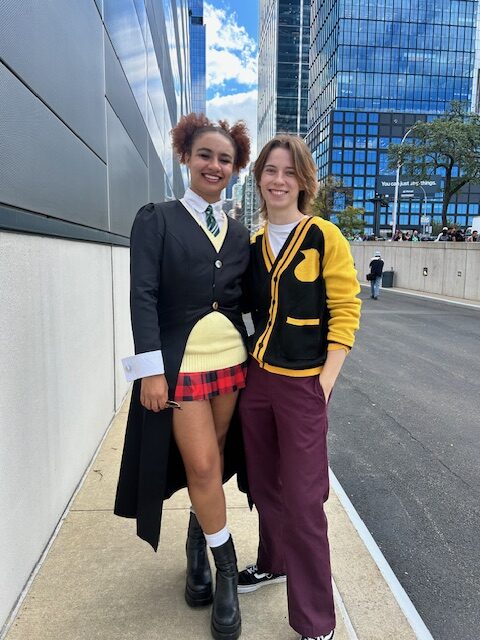
Participating in his third New York City Marathon, Dave Fraser wheeled himself backwards with one foot through the race and across the finish line, accompanied by his two guides. Photo by Bola Omisore
Long after the elite runners had finished, the floodlights had been dimmed and the crowds had thinned to nothing, the last runners in the New York City Marathon streamed across the finish line, one by one, late Sunday night. Ten hours after the race had begun, and eight hours after the winner claimed his medal, Dave Fraser, a 42-year-old living with cerebral palsy, crossed the finish line backwards.
In his wheelchair, Fraser pushed himself backward with one foot for the entire 26.2 miles of the run from Staten Island to Central Park.
“I don’t care how long it takes me, as long as I cross the finish line, you know,” Fraser said. “And when I do it, I’m happy. That’s why every year, I come back.”
This triumph came shortly after the appearance of a controversial New York Times article, which questioned the rightful place of “plodders” in the New York City Marathon, suggesting the prestige of the race is diminished by the participation of non-elite runners.
“The only people that would think that way are these ‘elite runners,’ who are probably in top shape already,” said Tim Strazza, 28, of Brooklyn. “That’s like all the healthy people in the world saying to the sick people, ‘You can’t be in the same hospital as me,’ even though they’re the ones that most need it and are the most driven to be there.”
Many of the spectators who gathered in the cold and stayed late into the night to cheer on straggling strangers agreed with Strazza.
“I come every year after three o’clock, after the winners have won, because these are the people I admire the most,” said Allison Becker, 47, of Manhattan.
While the ‘true’ athletes value the marathon as a physical achievement, the race means something different to the people who ran in support of a cause.
Like many other late finishers who were running to raise awareness and money for causes close to their hearts, Fraser ran to raise money to start a sports club for disabled youth interested in competitive sports.
Also finishing well outside of the elite time bracket was Shayna Ramirez, 32, who walked into the arms of her mother, sister and niece, all of whom had participated in support of a common goal.
“We’re running for my daughter,” Ramirez said. “She has Prader-Willi syndrome, and we’re spreading the word about Prader-Willi while raising money.”
After more than 10 hours of running, many marathoners were overcome by the emotion behind their causes. Jennifer Ballinger, 38, of Staten Island, stumbled across the finish line in tears, as she recounted the story of her uncle who died of a heart attack after last year’s marathon.
“He ran with the Achilles Foundation every year for four years,” Ballinger said of her fallen uncle. “He was diabetic, he got a kidney replacement, but he still ran for the cause. So, this year, eight of us decided to run in his honor, and they finished an hour ago. But I just had to finish; I just had to.”
The “plodders” didn’t break any records for speed, but they were able to serve as bastions of hope and inspiration to those who cheered them on.
“The non-athletes who spend six, seven, eights hours in this endeavor, those are the real winners,” said Becker. “And it’s just the greatest thing; it’s inspirational, and I wish I was as strong as them.”

